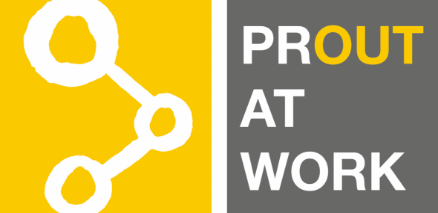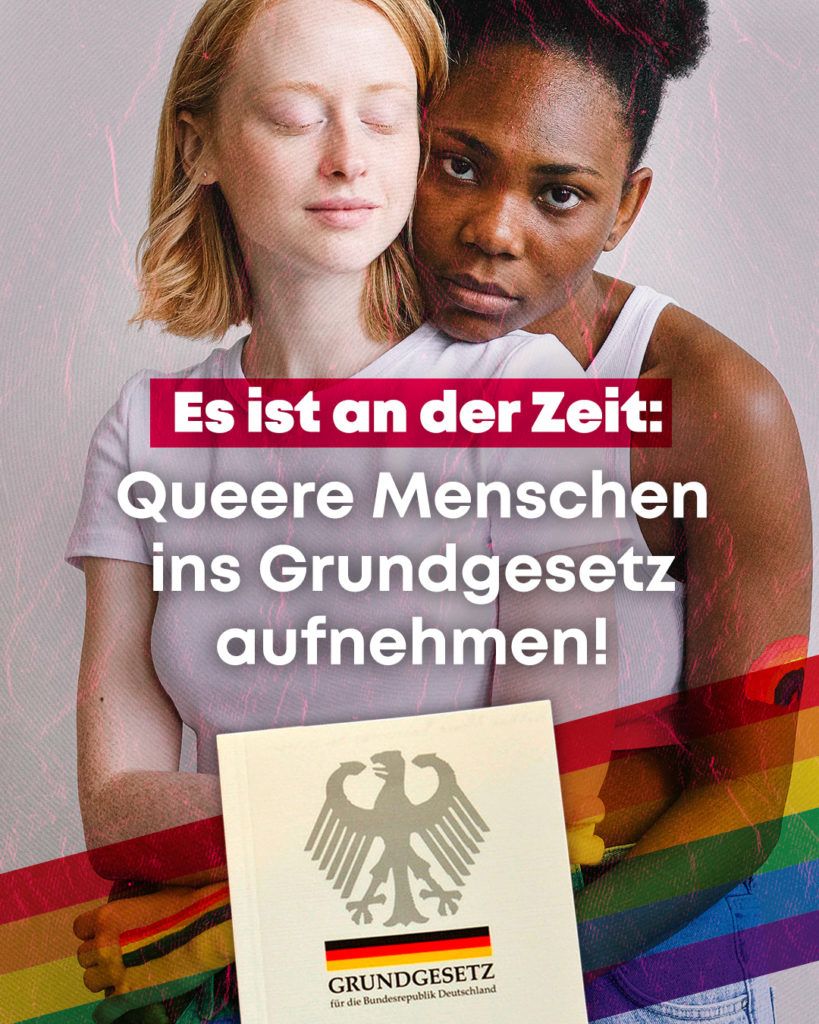
LGBT*IQ people are still not protected by Article 3 in the German Constitution. Many people from the LGBT*IQ community experience discrimination, exclusion and hate violence. We feel that a protection by the Constitution is indispensable and thus PROUT AT WORK is one of the first signatories of the appeal “A Basic Law for All”.
Federal government and Bundestag are currently negotiating the deletion of the term “race” in Article 3 of the Constitution. Let’s join together to send a strong message to politicians that sexual orientation and gender identity must be added to the article as well.
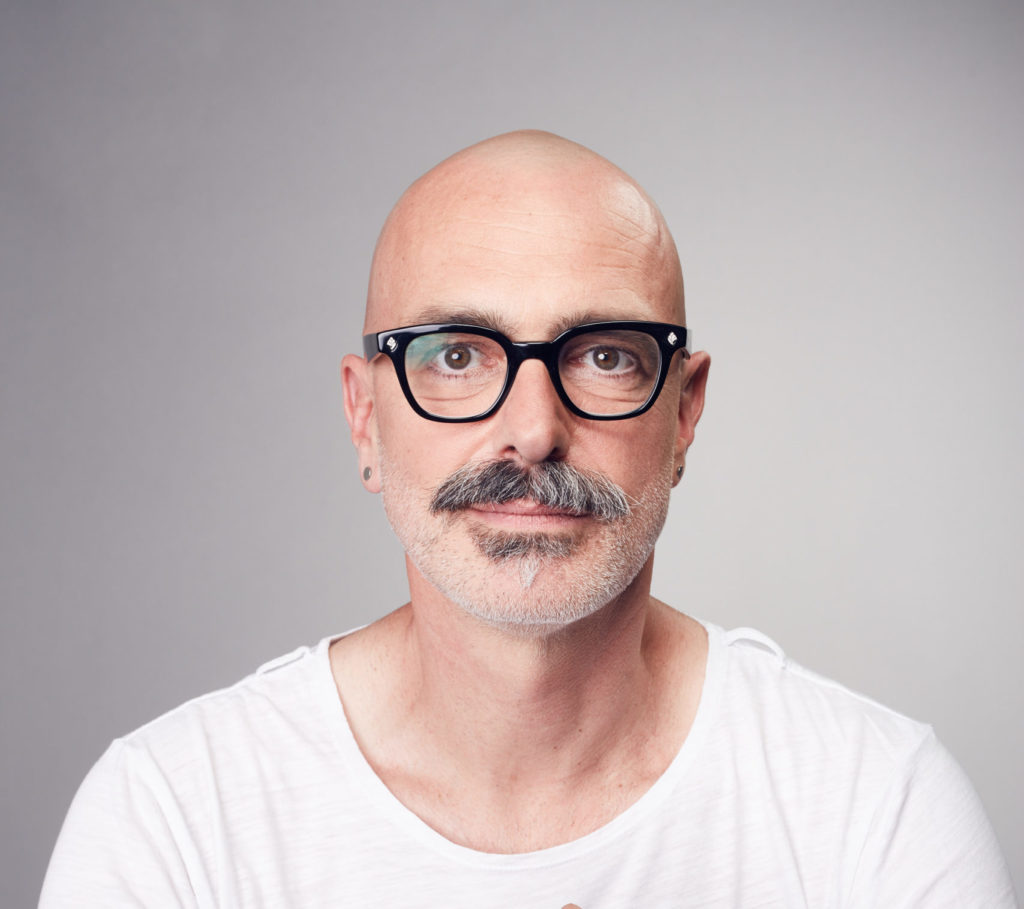
Our board member Albert Kehrer talked with Tagesgespräch host Christine Krueger about the question “Why is Coming Out still difficult”. The conversation can now be listened to online.
Once a month our board member Albert Kehrer invites an inspiring role model of the LGBT*IQ community or an LGBT*IQ Ally for a chat. You can look forward to an interesting exchange about role models and visibility in the LGBT*IQ community.
GUEST OF THE DAY
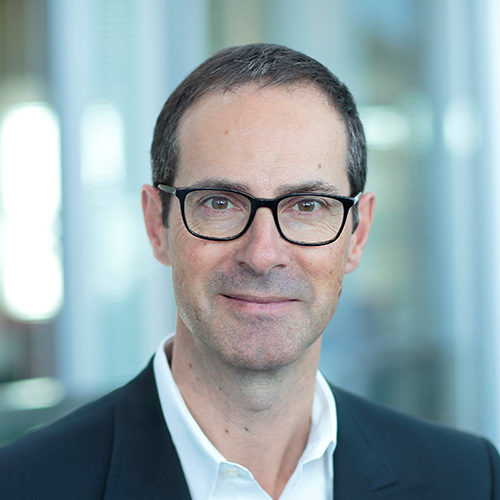
© Vaughan Price
Vaughan Price
Partner at PwC
Founder and partner sponsor for Shine, the PwC LGBT+ network and member of the global PwC LGBT+ Partner Board
Ranked 7th on the TOP 100 OUT EXECUTIVES list 2020
After completing his mathematics degree, Vaughan started his career with PwC in London in 1985. After 6 years he moved to Munich as an FCA where he joined the PwC Germany partnership in 1998. He is an Assurance Inbound Leader at PwC Germany as well as Leader of the UK-German Business Network.
He is a founder and partner sponsor of the LGBT+ Network, as well as a member of the PwC Global LGBT+ Board and the regional committee of the British Chamber of Commerce in Germany. As part of a global mentoring programme, Vaughan mentors a young gay future leader based in Africa, supporting him through regular face-to-face and virtual meetings to help him develop at this critical stage in his career.
He speaks at numerous events and participates in panel discussions at companies as well as LGBT+ organisations, thereby promoting the visibility of LGBT+ issues in the workplace and establishing LGBT+ inclusivity as an inherent part of corporate culture.
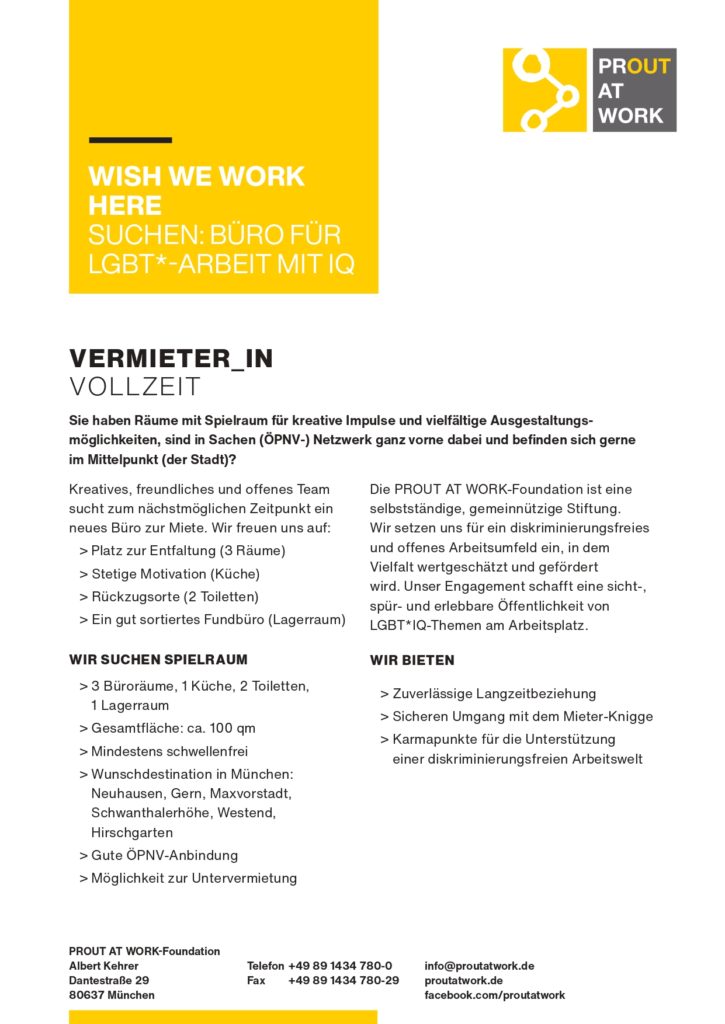
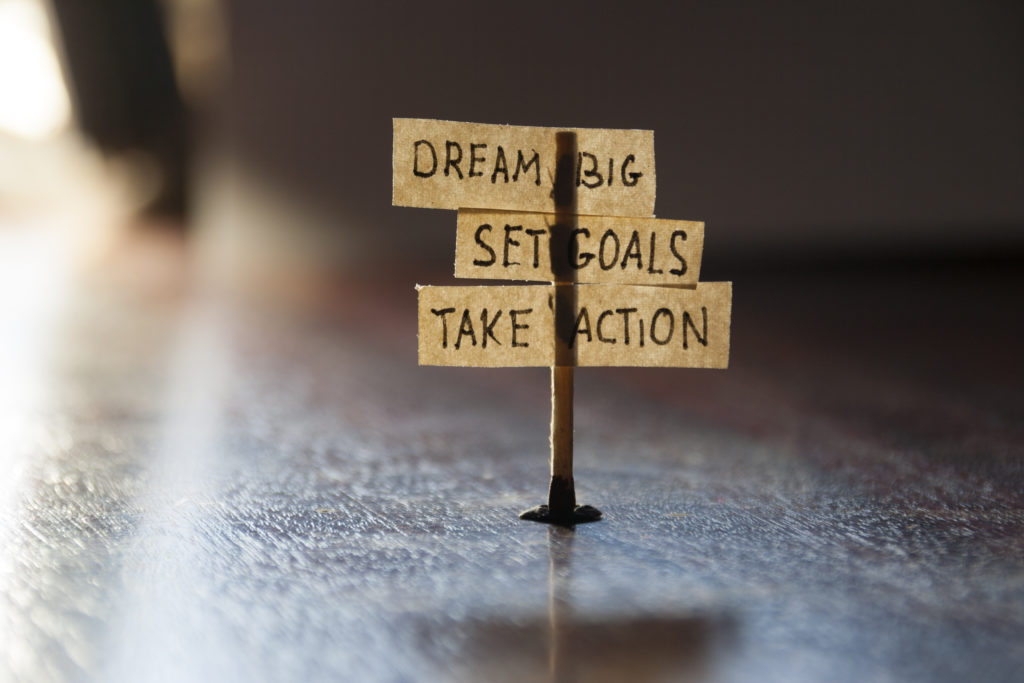
Who is your LGBT*IQ Role Model? Nominations via our new website are open now! Find out more additional info about our new project.
Once a month our board member Albert Kehrer invites an inspiring role model of the LGBT*IQ community or an LGBT*IQ Ally for a chat. You can look forward to an interesting exchange about role models and visibility in the LGBT*IQ community.
Guest of the day
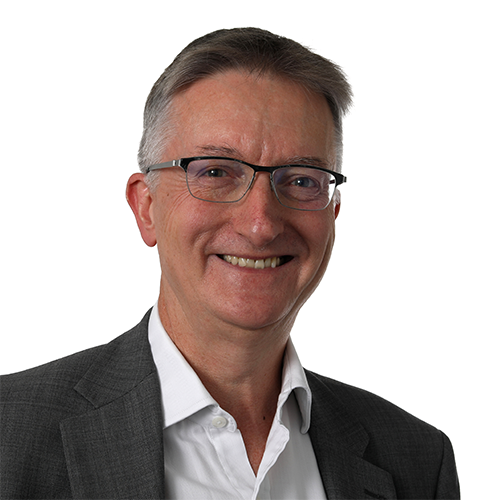
Nick Mott
Senior Adviser at Dentons; Chair Dentons Global LGBT+ network
100 OUTstanding LGBT+ Executives Role Model Lists 2018 and 2019
Nick has been at global law firm Dentons for many years, most recently as Assistant General Counsel (Partner). Between 2014 to 2019 he was also Diversity and Inclusion Partner in the UK during which he significantly raised the visibility and importance of Inclusion and Diversity within the Firm. He co-founded Dentons UK LGBT, Black Professionals and Asian Professionals (Fusion) networks, and was an early promoter of the concept of intersectionality . He also set up, and continues to chair, Dentons Global LGBT+ network which connects Dentons LGBT+ staff and their allies across its many regions, and raises awareness in a variety of ways, including an annual Dentons Global Pride Day. A passionate supporter of trans* colleagues, Nick instituted Dentons’ UK transitioning policies and related training, and has promoted greater staff awareness of trans* issues. During Nick’s tenure as D&I partner, Dentons UK was listed as a Stonewall Top 100 Employer for 4 years running. Dentons is also recognised as a Stonewall Top Global Employer 2020.
Externally Nick supports a number of LGBT+ charities including Diversity Role Models (which supports schools and pupils with LGBT+ awareness and bullying prevention) and is a volunteer with Opening Doors London as part of their tele-friending service for older LGBT+ people.
Nick retired from the partnership in 2020 and is now a senior global adviser to Dentons, advising on LGBT+ issues and awareness. He was proud to be named in the 100 OUTstanding LGBT+ Executives Role Model in 2018 and 2019.
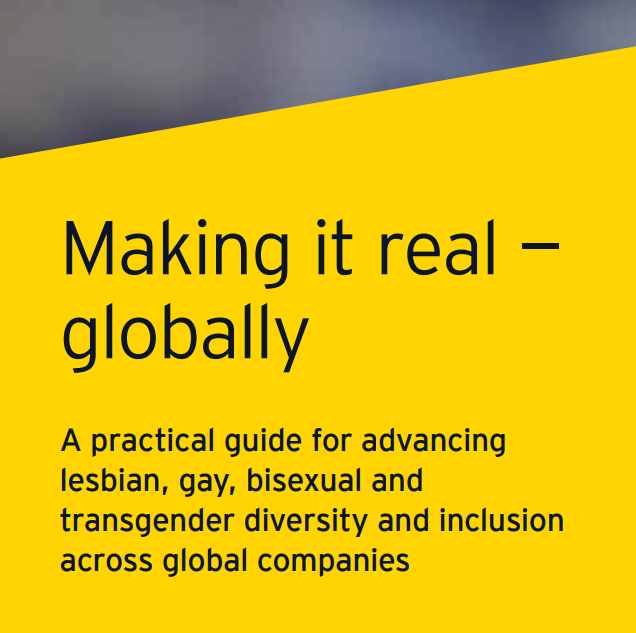
Recommended reading: PROUT EYMPLOYER EY published an update to the ‘Making it real’ guide first published in 2016 – including an overview of the drivers of diversity & inclusion engagement in global companies, and recommended actions for practical LGBT*IQ equal opportunities in the workplace.
As part of this publication, EY also published a paper on the situation of the LGBT*IQ community in the context of COVID-19, addressing how the events of 2020 will impact diversity & inclusion concepts and plans.
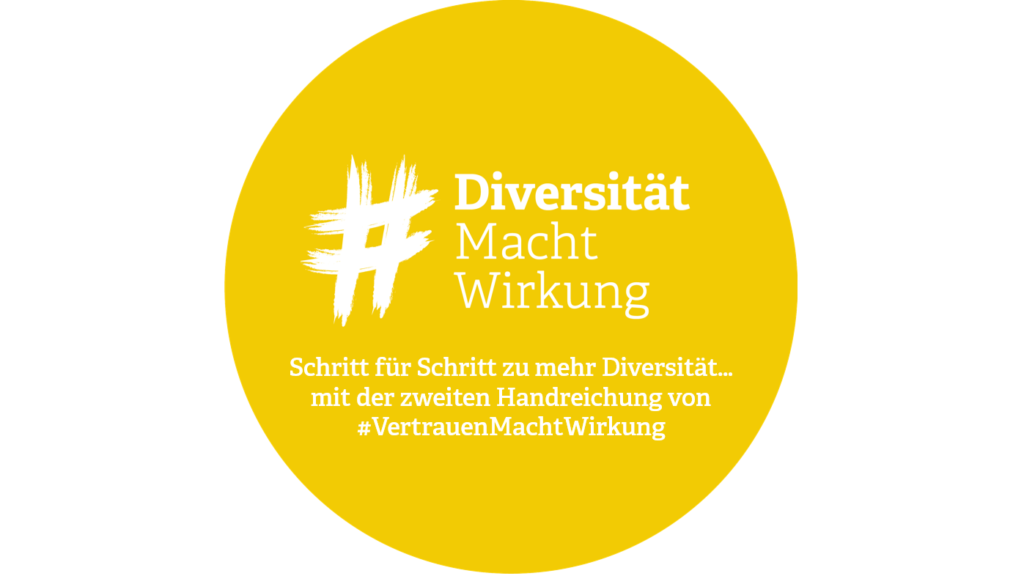
Diversity-conscious work is a cross-sectional sociopolitical task and should be a matter of course – also in foundations. The handout “DiversitätMachtWirkung – Schritt für mehr Diversität” shows how this can be achieved, with insights into various foundations, practical advice and reading tips. Also: tips for discrimination-free recruiting from our board member Albert Kehrer!
The Diversity Handout is available for download now.
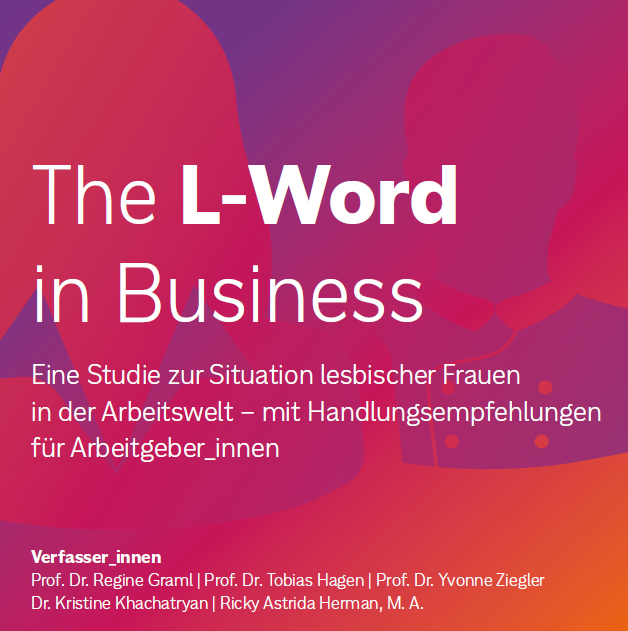
The Frankfurt University of Applied Sciences recently published a study on the situation of lesbian women in the workplace under the direction of Professor Dr. Regine Graml and with the collaboration of Prof. Dr. Tobias Hagen and Prof. Dr. Yvonne Ziegler. It discusses the intersection of homophobia and sexism and sheds light on the situation of working lesbian women in Germany in the application process and in working life.
The results of the study as well as recommendations for action for companies to eliminate discrimination were compiled in the brochure published by the Frankfurt University of Applied Sciences, the Bundesstiftung Magnus Hirschfeld, Wirtschaftsweiber e.V. and the PROUT AT WORK-Foundation.
You can now download thee study as a PDF and also order a printed copy. Both versions are only available in German.
Beyond male perpetrators and female victims
The keyword domestic violence is mostly associated with heterosexual relationships and a clear distribution of roles. The prevalence of violence in LGBT*IQ relationships, on the other hand, receives little public attention. Only in the last few years has the topic begun to appear in scientific studies.
On one hand, this may be due to the fact that women are indeed more often victims of domestic violence. But on the other hand, the lack of attention to the issue is also rooted in our stereotypical gender image and the ongoing discrimination against LGBT*IQ people. Domestic violence in non-heterosexual relationships is thus doubly taboo.
Violence has many faces
Especially the fact that violence is not always visible to the outside world often makes it difficult for victims to get help in time. This is because domestic violence rarely begins with a fist punch. Psychological abuse, which often precedes physical assaults, also falls under the term domestic violence, as do sexual assaults of various kinds. In violent relationships, the violence used often increases in intensity and various forms of violence intertwine.
More violence in lesbian and gay partnerships?
Violence is also not uncommon in partnerships that do not conform to the heterosexual relationship model. Studies show that people in homosexual relationships are affected by domestic violence just as often or even more often than those in heterosexual partnerships. Bisexual or trans* people are not covered by the already thin body of studies. However, it can be assumed that the situation within partnerships of these people is similar.
Men in particular rarely seek help because of the prevailing stereotype of the “dominant man. Yet homosexual men are just as often victims of intimate partner violence as women. A U.S. study concluded that almost half of all homosexual men – 46 percent – suffer from some form of partner violence.
In general, the number of unreported cases of sexual violence is high. For many people who experience violence in their relationship, the shame and fear of making their suffering public is huge.
Women do not fit the typical perpetrator image
If the violence is inflicted by a woman, it is often even more difficult for those affected to seek help. Because women do not fit the typical perpetrator image, violence in lesbian relationships is still strongly tabooed, and complaints from affected persons are often not taken seriously.
Women – in line with the typical cliché image – are often attributed a rather gentle disposition and a pronounced need for harmony. However, domestic violence is unfortunately not uncommon in lesbian relationships either. Angela Schwarz of the Vienna Anti-Discrimination Agency for Same-Sex and Transgender Lifestyles (WASt) further explains in an interview with the Austrian feminist magazine an.schläge that only three to five percent of those affected in lesbian relationships seek help. In heterosexual relationships, 20 to 24 percent do. Male victims of domestic violence by women also rarely come forward with their experiences.
Counseling services for LGBT*IQ-people are meager
In general, there are only a few support programs and counseling services that explicitly address those affected within the LGBTIQ-community. Even though trans women are generally welcome in German women’s shelters, the Frauenhauskoordinierung e.V. recognizes that there are “large gaps” in support for trans* women experiencing violence. The same applies to male victims of domestic violence.
The Broken Rainbow association, which advocates for lesbian and trans* women and queer people affected by violence, states in its 2019 annual report that “many clients have had negative experiences in general counseling or mental health care” because they experience discrimination of various kinds due to their gender identity. Precisely because LGBTIQ people often experience little understanding anyway due to their deviation from the binary or heterosexual “norm,” special counseling services and protective programs against domestic violence are especially important for these individuals. Help for those affected is offered, for example, by the MANEO project (for gay people affected by violence) or the gewaltfreileben counseling center (for women, lesbians, trans and queer people).
